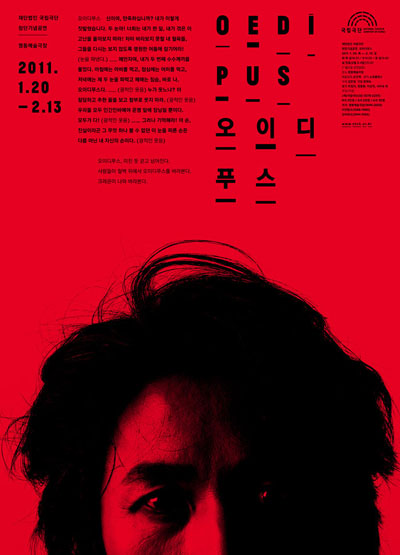One thing I love about walking around in a city is that you can always find new places to go to, whether it is a shop or cafe that just opened up. As I was strolling down the streets of Myeong-dong, this time searching for the pair of shoes I’ve been preying on all winter, I stumbled upon something different instead. When I saw that Sophocles’ famous tragedy Oedipus was playing at the Myeong-dong Theater, I knew I had to go see it.

The plot develops the hubris of Oedipus as he discovers that he killed his father and slept with his own mother. As did the Athenian audience in 429 BC, we too are fully aware of the plot (at least I hope so) to fully appreciate Sophocles’ use of dramatic irony. Director Tae-suk Han, who has been working in theater since 1994, has carefully picked and highlighted the right lines that display the ignorance of Oedipus and Jocasta, his mother and wife, towards the deity, accentuating the doom that would befall on them.
Though the story of this interpretation was relatively true to the written play, there were some modifications to the characters. For example, the Chorus, which should not only act as a guide to the storyline but also represent the citizens of Thebes, was clothed in ragged, dirty, but modern attire. This contemporary twist that delineates the contamination of the setting in plays seems to be a common, maybe even hackneyed technique incorporated by many directors. If you have seen the adaptation of the three witches in Macbeth from BBC’s Shakespeare Retold, you would see how it can be done better (however I might be biased because James McAvoy starred as Macbeth, which I cannot deny as the reason why I watched it). Also the blind prophet Tiresias was a woman instead of a man, and he had a human/bird creature which I fail to understand the necessity of, but I’m sure the whole audience as well as myself was amazed at how talented the bird actor was.
What interested me more than the actual play was the stage setting. Every single feature was cleverly placed and detailed that I am not sure where to begin. First of all, the black triangular floor of the stage sloping down towards the audience was framed by another black triangular surface on the right that acts as a wall, creating sharp angles that surround the stage that accentuate the tension and the instability in Thebes. The trapped feeling created by the right wall craftily represented the physical and mental confinement that human beings must overcome, which is what the whole play is about. The wall was filled with chalk drawings of depressing faces that look down onto the characters on the stage, and the adding and smudging of the drawings done by the actors themselves while still realizing their characters visually stimulated the audience even more.
Throughout the whole production, I was hoping that the director wouldn’t make Jocasta commit suicide on stage just to make the play more dramatic. Sophocles purposely wrote it to happen offstage to allow the audience to actually experience the theme of the play, which is to use your mind and think, like Oedipus does. Visually displaying the gore would prevent the audience from actually imagining and creating their own image of the scene, and I am glad to report that my doubts were unwarranted.
When Oedipus finally realizes his true identity and ignorance towards the gods, he blinds himself by gashing out his eyes. In this performance, Oedipus faced towards the right wall and another actor throws two fist-sized white balls against the wall above Oedipus’s head. With a loud bang on the wall as the eyeball sculptures break into pieces releasing blood-like liquid dripping down the wall, Oedipus screams and covers his eyes with his hands. These aural and visual stimuli impact the audience so effectively that we are momentarily shocked by Oedipus’s actions despite our knowing of his predetermined destiny.
This version of Oedipus produced by the National Theater Company of Korea received many positive critiques and the performance has been sold out for every single date. Yes, there were some modifications that were extraneous and the acting seemed too over-the-top, but then again I’m not an avid theatergoer so I might not be used to this type of acting (I can’t stand musicals; they make me cringe). But there were enough strong aspects of the play that allow these to be overlooked. I highly recommend seeing it, especially if you have read and enjoyed Sophocles’ written play. I walked out of the theater still in awe of the director’s ability to move the audience with her dramatic interpretations, and I am sure anyone else would.

